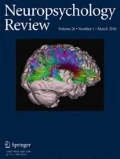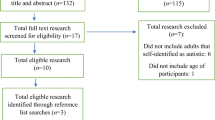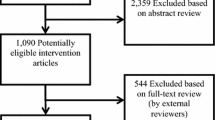Abstract
Perceptions about the causes and consequences of concussion, and individual representations and interpretations of these factors, can influence the post-concussive recovery process. The goal of this project was to synthesize evidence on perceptions related to concussions as experienced by children, adolescents, and parents, and to evaluate how these perceptions impact post-concussive recovery in physical, behavioural, cognitive, and psychological domains. We undertook a systematic review based on the Cochrane Handbook, conducting a comprehensive search of six databases and Google Scholar. Duplicate, independent screening was employed and the quality of studies was assessed using the Mixed Methods Appraisal Tool (MMAT). A total of 1552 unique records were identified, and six records (5 scientific articles and 1 thesis, published between 1990 and 2018; N = 26 to 412, age range from 2 to 18 years) were included. Perceptions about concussions were assessed differently between studies, with a range in types of measures and respondents. Some evidence suggested that perceptions could negatively impact concussion recovery, mostly post-concussive symptoms. However, results were not consistent between studies and the methodological quality was variable (and often low). There is limited evidence of the impact of perceptions of children, adolescents, and their parents on concussion recovery. Priorities for future research investigating concussion recovery should include recruiting representative samples, accounting for potential confounders, and measuring perceptions in children, adolescents and parents using validated measures. Higher quality studies are needed to better understand the role of perceptions in concussion recovery and to inform clinical care.

Similar content being viewed by others
References
Baker, J. E. (1990). Family adaptation when one member has a head injury. Journal of Neuroscience Nursing, 22(4), 232–237.
Beauchamp, M. H., Agilpay, M., Yeates, K. O., Désiré, N., Keithley, M., Anderson, P., … Team, 5P PERC Concussion. (2018). Predictors of neuropsychological outcome after pediatric concussion. Neuropsychology, 32(4), 495–508. https://doi.org/10.1037/neu0000419
Beauchamp, M. H., & Yeates, K. O. (2019). Introduction to JINS special section : Resilience and wellness after pediatric acquired brain injury. Journal of the International Neuropsychological Society, 25, 343–345. https://doi.org/10.1258/jtt.2012.120404
Bernard, C. O., Ponsford, J. A., McKinlay, A., McKenzie, D., & Krieser, D. (2016). Predictors of post-concussive symptoms in young children: Injury versus non-injury related factors. Journal of the International Neuropsychological Society, 22(8), 793–803. https://doi.org/10.1017/S1355617716000709
Block, C. K., West, S. E., & Goldin, Y. (2016). Misconceptions and misattributions about traumatic brain injury: An integrated conceptual framework. PM & R : The Journal of Injury, Function, and Rehabilitation, 8(1), 58–68.e4. https://doi.org/10.1016/j.pmrj.2015.05.022
Bowling, A. (2005). Just one question: If one question works, why ask several? Journal of Epidemiology and Community Health, 59(5), 342–345.
Broadbent, E. (2010). Illness perceptions and health : Innovations and clinical applications. Social and Personality Psychology Compass, 4, 256–266. https://doi.org/10.1111/j.1751-9004.2010.00260.x
Broadbent, E. (2015). A systematic review and meta-analysis of the brief illness perception questionnaire. Psychology & Health, 30(11), 1361–1385. https://doi.org/10.1080/08870446.2015.1070851
Broadbent, E., Petrie, K. J., Main, J., & Weinman, J. (2006). The brief illness perception questionnaire. Journal of Psychosomatic Research, 60, 631–637. https://doi.org/10.1016/j.jpsychores.2005.10.020
Broadbent, E., Schoones, J. W., Tiemensma, J., & Kaptein, A. A. (2018). A systematic review of patients ’ drawing of illness : Implications for research using the common sense model research using the common sense model. Health Psychology Review, advanced online publication. https://doi.org/10.1080/17437199.2018.1558088
Brooks, B. L., Kadoura, B., Turley, B., Crawford, S., Mikrogianakis, A., & Barlow, K. M. (2014). Perception of recovery after pediatric mild traumatic brain injury is influenced by the “good old days” bias: Tangible implications for clinical practice and outcomes research. Archives of Clinical Neuropsychology, 29(2), 186–193. https://doi.org/10.1093/arclin/act083
Brown, S. A., Upchurch, S. L., & Acton, G. J. (2003). A framework for developing a coding scheme for meta-analysis. Western Journal of Nursing Research, 25(2), 205–222. https://doi.org/10.1177/0193945902250038
Carter-Allison, S. N., Potter, S., & Rimes, K. (2016). Diagnosis threat and injury beliefs after mild traumatic brain injury. Archives of Clinical Neuropsychology, 31(7), 727–737. https://doi.org/10.1093/arclin/acw062
Cheung, M. M. Y., Saini, B., & Smith, L. (2016). Using drawings to explore patients ’ perceptions of their illness : A scoping review. Journal of Multidisciplinary Healthcare, 9, 631–646. https://doi.org/10.2147/JMDH.S120300
Davis, G. A., Anderson, V., Babl, F. E., Gioia, G. A., Giza, C. C., Meehan, W., … Zemek, R. (2017). What is the difference in concussion management in children as compared with adults ? A systematic review. British Journal of Sports Medicine, 51(12), 949–957. https://doi.org/10.1136/bjsports-2016-097415
Engel, G. L. (1980). The clinical application of the biopsychosocial model. American Journal of Psychiatry, 13, 535–544. https://doi.org/10.1176/ajp.137.5.535
Ewing-Cobbs, L., Cox, C. S., Clark, A. E., Holubkov, R., & Keenan, H. T. (2018). Persistent Postconcussion Symptoms After Injury. Pediatrics, 142(5), e20180939. https://doi.org/10.1542/peds.2018-0939
Fawcett, N., Gibson, H., & Abraham, S. (2017). Perceptions of college student-athletes regarding the long-term effects of concussions. The Health Care Manager, 36(3), 210–218. https://doi.org/10.1097/HCM.0000000000000169
Fisher, G. G., Matthews, R. A., & Gibbons, A. M. (2016). Developing and investigating the use of single-item measures in organizational research. Journal of Occupational Health Psychology, 21(1), 3–23.
Gagner, C., Landry-Roy, C., Laine, F., & Beauchamp, M. H. (2015). Sleep-wake disturbances and fatigue after pediatric traumatic brain injury. Journal of Neurotrauma, 32, 1539–1552. https://doi.org/10.1089/neu.2014.3753
Grubenhoff, J. A., Currie, D., Comstock, R. D., Juarez-Colunga, E., Bajaj, L., & Kirkwood, M. W. (2016). Psychological factors associated with delayed symptom resolution in children with concussion. Journal of Pediatrics, 174, 27–32.e1. https://doi.org/10.1016/j.jpeds.2016.03.027
Gunstad, J., & Suhr, J. A. (2001). “Expectation as etiology” versus “the good old days”: Postconcussion syndrome symptom reporting in athletes, headache sufferers, and depressed individuals. Journal of the International Neuropsychological Society, 7(3), 323–333. https://doi.org/10.1017/S1355617701733061
Hagger, M. S., Koch, S., Chatzisarantis, N. L. D., Arat, S., Araújo-soares, V., Benyamini, Y., … Twiddy, M. (2017). The common sense model of self-regulation : Meta-analysis and test of a process model. Psychological Bulletin, 143(11), 1117–1154. doi. https://doi.org/10.1037/bul0000118
Hagger, M. S., & Orbell, S. (2003). A meta-analytic review of the common-sense model of illness representations. Psychology and Health, 18(2), 141–184. https://doi.org/10.1080/088704403100081321
Hong, Q. N., Pluye, P., Fàbregues, S., Bartlett, G., Boardman, F., Cargo, M., … Vedel, I. (2018). Mixed Methods Appraisal Tool (MMAT), version 2018. Registration of copyright (#1148552). Canadian Intellectual Property Office, Industry Canada.
Hou, R., Moss-Morris, R., Peveler, R., Mogg, K., Bradley, B. P., & Belli, A. (2012). When a minor head injury results in enduring symptoms : A prospective investigation of risk factors for postconcussional syndrome after mild traumatic brain injury. Journal of Neurology, Neurosurgery & Psychiatry, 83, 217–223. https://doi.org/10.1136/jnnp-2011-300767
Howell, D. R., Zemek, R., Brilliant, A. N., Mannix, R. C., Master, C. L., & Iii, W. P. M. (2018). Identifying persistent Postconcussion symptom risk in a pediatric sports medicine clinic. The American Journal of Sports Medicine, 46(13), 3254–3261. https://doi.org/10.1177/0363546518796830
Irwin, J. K. (2018). When the past becomes the “good old days”: Adolescents underestimate pre-injury post-concussion-like symptoms by one month after mild traumatic brain injury. University of Victoria.
Iverson, G. L. (2012). A biopsychosocial conceptualization of poor outcome from mild traumatic brain injury. In J. J. Vasterling, R. A. Bryant, & T. M. Keane (Eds.), PTSD and mild traumatic brain injury (pp. 37–60). New York: The Guilford Press.
Iverson, G. L., Gardner, A. J., Terry, D. P., Ponsford, J. L., Sills, A. K., Broshek, D. K., & Solomon, G. S. (2017). Predictors of clinical recovery from concussion : A systematic review. British Journal of Sports Medicine, 51(12), 941–948. https://doi.org/10.1136/bjsports-2017-097729
Iverson, G. L., Lange, R. T., Brooks, B. L., & Ashton, V. L. (2010). “ Good Old Days ” Bias Following Mild Traumatic Brain Injury. The Clinical Neuropsychologist, 24(1), 17–37. https://doi.org/10.1080/13854040903190797
Jones, K. M., Kydd, R., Broadbent, E., Theadom, A., Edwards, H., Feigin, V. L., … Group, B. S. (2016). Brain drawings following traumatic brain injury (TBI) and links to illness perceptions and health outcomes – Findings from a population-based study. Psychology & Health, 31(10), 1182–1202. https://doi.org/10.1080/08870446.2016.1193178
Jones, K. M., Theadom, A., Barker-Collo, S., Broadbent, E., & Feigin, V. L. (2017). Associations between brain drawings following mild traumatic brain injury and negative illness perceptions and post-concussion symptoms at 4 years. Journal of Health Psychology, advanced online publication. https://doi.org/10.1177/1359105317695430
Lange, R. T., Iverson, G. L., & Rose, A. (2010). Post-concussion symptom reporting and the “ good-old-days ” Bias following mild traumatic brain injury. Archives of Clinical Neuropsychology, 25, 442–450. https://doi.org/10.1093/arclin/acq031
Leventhal, H., Meyer, D., & Nerenz, D. (1980). The common sense representation of illness danger. Contributions to Medical Psychology, 2, 7–30.
Leventhal, H., Phillips, L. A., & Burns, E. (2016). The common-sense model of self-regulation (CSM ): A dynamic framework for understanding illness self-management. Journal of Behavioral Medicine, 39(6), 935–946. https://doi.org/10.1007/s10865-016-9782-2
Lumba-Brown, A., Yeates, K. O., Sarmiento, K., Breiding, M. J., Haegerich, T. M., Gioia, G. A., … Timmons, S. D. (2018). Diagnosis and Management of Mild Traumatic Brain Injury in children a systematic review. JAMA Pediatrics, 172(11). https://doi.org/10.1001/jamapediatrics.2018.2847
Mah, K., Hickling, A., & Reed, N. (2017). Perceptions of mild traumatic brain injury in adults: A scoping review. Disability and Rehabilitation, advanced o, 1–17. https://doi.org/10.1080/09638288.2016.1277402
Mccauley, S. R., Wilde, E. A., Anderson, V. A., Bedell, G., Beers, S. R., Campbell, T. F., … Yeates, K. O. (2012). Recommendations for the use of common outcome measures in pediatric traumatic brain injury research. Journal of Neurotrauma, 29(4), 678–705. https://doi.org/10.1089/neu.2011.1838
McGrady, M. E., Cotton, S., Rosenthal, S. L., Humenay, Y., Britto, M., Yi, M. S., & Yi, S. C. Á. M. S. (2010). Anxiety and asthma symptoms in urban adolescents with asthma : The mediating role of illness perceptions. Journal of Clinical Psychology in Medical Settings, 17(4), 349–356. https://doi.org/10.1007/s10880-010-9214-3
McKinlay, A., & Buck, K. (2018). Misconceptions about traumatic brain injury among educators : Has anything changed over the last 20 years ? Disability and Rehabilitation, advanced online publication. https://doi.org/10.1080/09638288.2018.1429500
McNally, K. A., Patrick, K. E., LaFleur, J. E., Dykstra, J. B., Hoskinson, K. R., Mcnally, K. A., … Dykstra, J. B. (2018). Brief cognitive behavioral intervention for children and adolescents with persistent post-concussive symptoms : A pilot study. Child Neuropsychology, 3(24), 396–412. https://doi.org/10.1080/09297049.2017.1280143
Moher, D., Liberati, A., Tetzlaff, J., Altman, D. G., & Group, T. P. (2009). Preferred reporting items for systematic reviews and meta-analyses : The PRISMA statement. PLoS Medicine, 6(7), e1000097. https://doi.org/10.1371/journal.pmed.1000097
Moher, D., Pham, B., Lawson, M., & Klassen, T. (2003). The inclusion of reports of randomised trials published in languages other than English in systematic reviews. Health Technology Assessment, 7(41). https://doi.org/10.3310/hta7410
Morrison, A., Polisena, J., Husereau, D., Moulton, K., Clark, M., Fiander, M., … Rabb, D. (2012). The effect of English-language restriction on systematic review-based meta-analyses: A systematic review of empirical studies. International Journal of Technology Assessment in Health Care, 28(2), 138–144. doi. https://doi.org/10.1017/S0266462312000086
Novak, Z., Aglipay, M., Barrowman, N., Yeates, K. O., Beauchamp, M. H., Gravel, J., … Zemek, R. L. (2016). Association of Persistent Postconcussion Symptoms with Pediatric Quality of life. JAMA Pediatrics, E1–E8. https://doi.org/10.1001/jamapediatrics.2016.2900
Potter, S., & Brown, R. G. (2012). Cognitive behavioural therapy and persistent post-concussional symptoms: Integrating conceptual issues and practical aspects in treatment. Neuropsychological Rehabilitation, 22(1), 1–25. https://doi.org/10.1080/09602011.2011.630883
Rausa, V. C., Anderson, V., Babl, F. E., & Takagi, M. (2018). Predicting concussion recovery in children and adolescents in the emergency department. Current Neurology and Neuroscience Reports, 18(11), 78. doi. https://doi.org/10.1007/s11910-018-0881-z
Register-Mihalik, J. K., Williams, R. M., Marshall, S. W., Linnan, L. A., Mihalik, J. P., Cat, C., … Mcleod, T. C. V. (2018). Demographic, parental, and personal factors and youth athletes’ concussion-related knowledge and beliefs. Journal of Athletic Training, 53(8), 768–775. https://doi.org/10.4085/1062-6050-223-17
Ringlever, L., Otten, R., van Schayck, O. C. P., & Engels, R. C. M. E. (2012). The role of maternal illness perceptions in perceived asthma symptoms in school-aged children. Journal of Asthma, 49(10), 1030–1036. https://doi.org/10.3109/02770903.2012.726305
Sandel, N., Henry, L. C., French, J., Lovell, M. R., Sandel, N., Henry, L. C., … Lovell, M. R. (2015). Parent perceptions of their adolescent Athlete’s concussion : A preliminary retrospective study. Applied Neuropsychology: Child, 4(3), 211–216. https://doi.org/10.1080/21622965.2013.850692
Sandel, N. K., Lovell, M. R., Kegel, N. E., Collins, M. W., & Kontos, A. P. (2013). The relationship of symptoms and neurocognitive performance to perceived recovery from sports-related concussion among adolescent athletes. Applied Neuropsychology: Child, 2(1), 64–69. https://doi.org/10.1080/21622965.2012.670580
Schoth, D. E., Beaney, R., Broadbent, P., Zhang, J., & Liossi, C. (2019). Attentional , interpretation and memory biases for sensory-pain words in individuals with chronic headache. British Journal of Pain, 13(1), 22–31. https://doi.org/10.1177/2049463718789445
Schoth, D. E., & Liossi, C. (2016). Biased interpretation of ambiguous information in patients with chronic pain : A systematic review and meta-analysis of current studies. Health Psychology, 35(9), 944–956.
Scopaz, K. A., & Hatzenbuehler, J. R. (2013). Risk modifiers for concussion and prolonged recovery. Sports Health, 5(6), 537–541. https://doi.org/10.1177/1941738112473059
Silverberg, N., Hallam, B., Rose, A., Underwood, H., Whitfield, K., Thornton, A., & Whittal, M. (2013). Cognitive-behavioral prevention of Postconcussion syndrome in at-risk patients: A pilot randomized controlled trial. The Journal of Head Trauma Rehabilitation, 28(4), 313–322. https://doi.org/10.1097/HTR.0b013e3182915cb5
Silverberg, N. D., Iverson, G. L., Brubacher, J. R., Holland, E., Hoshino, L. C., Aquino, A., & Lange, R. T. (2016). The nature and clinical significance of preinjury recall bias following mild traumatic brain injury. The Journal of Head Trauma Rehabilitation, 31(6), 388–396. https://doi.org/10.1097/HTR.0000000000000198
Snell, D. L., Hay-Smith, E. J. C., Surgenor, L. J., & Siegert, R. J. (2013). Examination of outcome after mild traumatic brain injury : The contribution of injury beliefs and Leventhal’ s common sense model injury. Neuropsychological Rehabilitation, 23(3), 333–362. https://doi.org/10.1080/09658211.2012.758419
Snell, D. L., Siegert, R. J., Hay-Smith, E. J. C., & Surgenor, L. J. (2011). Associations between illness perceptions, coping styles and outcome after mild traumatic brain injury : Preliminary results from a cohort study. Brain Injury, 25(11), 1126–1138. https://doi.org/10.3109/02699052.2011.607786
Sonney, J. T., Gerald, L. B., & Insel, K. C. (2016). Parent and child asthma illness representations : A systematic review. Journal of Asthma, 53(5), 510–516. https://doi.org/10.3109/02770903.2015.1116088
Sonney, J. T., & Insel, K. C. (2016). Reformulating the common sense model of self-regulation : Toward parent-child shared regulation. Nursing Science Quarterly, 29(2), 154–159. https://doi.org/10.1177/0894318416630091
Spirito, A., Stark, L. J., & Williams, C. (1988). Development of a brief coping checklist for use with pediatric populations. Journal of Pediatric Psychology, 13(4), 555–574.
van der Velde, J. L., Flokstra-de Blok, B. M. J., Hamp, A., Knibb, R. C., & Duiverman, E. J. (2011). Adolescent – Parent disagreement on health-related quality of life of food-allergic adolescents : Who makes the difference ? European Journal of Allergy and Clinical Immunology, 66(12), 1580–1589. https://doi.org/10.1111/j.1398-9995.2011.02726.x
Van Ryckeghem, D., Noel, M., Sharpe, L., Pincus, T., & Van Damme, S. (2019). Cognitive biases in pain: An integrated functional-contextual framework. PAIN, published ahead of print. https://doi.org/10.1097/j.pain.0000000000001508
von Elm, E., Altman, D. G., Egger, M., Pocock, S. J., Gøtzsche, P. C., & Vandenbroucke, J. P. (2008). The strengthening the reporting of observational studies in epidemiology (STROBE) statement: Guidelines for reporting observational studies. Journal of Clinical Epidemiology, 61, 344–349. https://doi.org/10.1016/j.jclinepi.2007.11.008
Walker, C., Papadopoulos, L., & Hussein, M. (2006). Paediatric eczema and psychosocial morbidity : How does eczema interact with parents’ illness beliefs ? Journal of the European Academy of Dermatology and Venereology, 21, 63–67. https://doi.org/10.1111/j.1468-3083.2006.01866.x
Walker, C., Papadopoulos, L., Lipton, M., & Hussein, M. (2006). The importance of children’s illness beliefs: The Children’s illness perception questionnaire (CIPQ) as a reliable assessment tool for eczema and asthma. Psychology, Health & Medecine, 11(1), 100–107. https://doi.org/10.1080/13548500500155792
Whittaker, R., Kemp, S., & House, A. (2007). Illness perceptions and outcome in mild head injury: A longitudinal study. Journal of Neurology, Neurosurgery, and Psychiatry, 78(6), 644–646. https://doi.org/10.1136/jnnp.2006.101105
Zemek, R., Barrowman, N., Freedman, S. B., Gravel, J., Gagnon, I., McGahern, C., … Pediatric Emergency Research Canada (PERC) Concussion Team. (2016). Clinical risk score for persistent postconcussion symptoms among children with acute concussion in the ED. Journal of the American Medical Association, 315(10), 1014–1025. https://doi.org/10.1001/jama.2016.1203
Zugelj, U., Zupancic, M., Komidar, L., Kenda, R., Varda, N. M., & Gregoric, A. (2010). Self-reported adherence behavior in adolescent hypertensive patients : The role of illness representations and personality. Journal of Pediatric Psychology, 35(9), 1049–1060. doi. https://doi.org/10.1093/jpepsy/jsq027
Acknowledgements
This work was supported by the Alberta Strategy for Patient-Oriented Research (SPOR) SUPPORT Unit Knowledge Translation Platform, which is funded by Alberta Innovates and the Canadian Institutes of Health Research. Thanks to Sholeh Rahman, MSc (research assistant) for assistance with the MMAT.
Author information
Authors and Affiliations
Corresponding author
Ethics declarations
Conflict of Interest
Brian Brooks receives royalties for the sales of the Pediatric Forensic Neuropsychology textbook (2012, Oxford University Press) and three pediatric neuropsychological tests [Child and Adolescent Memory Profile (ChAMP, Sherman and Brooks, 2015, PAR Inc.), Memory Validity Profile (MVP, Sherman and Brooks, 2015, PAR Inc.), and Multidimensional Everyday Memory Ratings for Youth (MEMRY, Sherman and Brooks, 2017, PAR Inc.)]. The other co-authors have no conflict of interest to declare.
Additional information
Publisher’s Note
Springer Nature remains neutral with regard to jurisdictional claims in published maps and institutional affiliations.
Appendices
Appendix 1
Appendix 2
Rights and permissions
About this article
Cite this article
Plourde, V., Kung, J.Y., Gates, A. et al. How Perceptions Impact Recovery from Concussion in Childhood and Adolescence: a Systematic Review. Neuropsychol Rev 30, 142–163 (2020). https://doi.org/10.1007/s11065-020-09430-y
Received:
Accepted:
Published:
Issue Date:
DOI: https://doi.org/10.1007/s11065-020-09430-y




